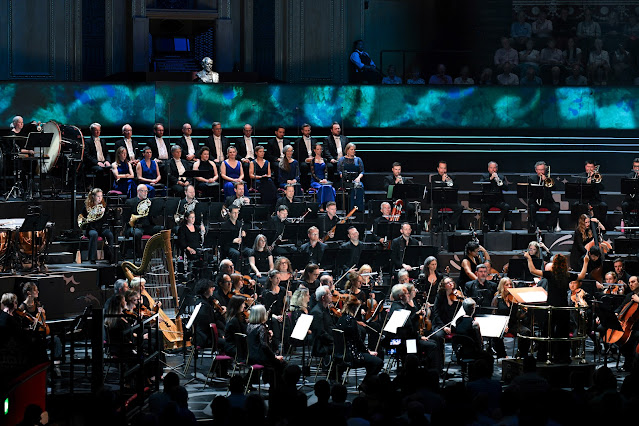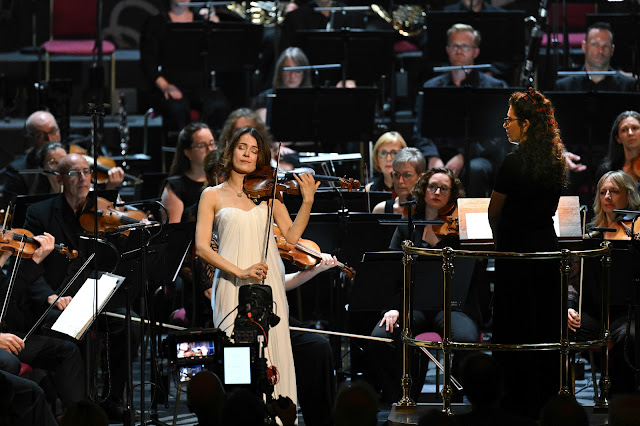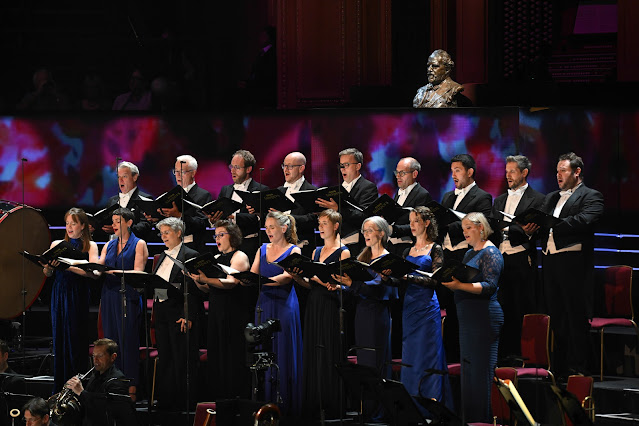 |
| Great British Classics – BBC Singers, BBC National Orchestra of Wales, Nil Venditti – BBC Proms 2025 (Photo: BBC / Chris Christodoulou) |
Great British Classics: Walton, Vaughan Williams, Coleridge-Taylor, Britten, William Mathias, John Rutter, Avril Coleridge-Taylor, Grace Williams, Elgar; Liya Petrova, BBC Singers, BBC National Orchestra of Wales, Nil Venditti; BBC Proms at the Royal Albert Hall
Reviewed 5 August 2025
The Italian-Turkish conductor mixed establish classics with varied bon-bons including John Rutter’s 80th birthday commission and ending with an engagingly fresh account of Elgar’s enduring masterpiece
Tuesday 5 August’s concert at the BBC Proms at the Royal Albert Hall was billed as Great British Classics. True, Nil Venditti did conduct the BBC National Orchestra of Wales in Walton’s Crown Imperial, Vaughan Williams’ The Lark Ascending (with violinist Liya Petrova), Britten’s Four Sea Interludes from Peter Grimes and Elgar’s Enigma Variations but someone had been rooting around in the library cupboards and so these works were shaken up with a selection of lesser-known bon-bons in the manner of a pre-War programmes. It was a very Proms programme too, mixing a cappella music from the BBC Singers with full orchestra in a way that few promoters could afford. But it meant that we heard part-songs by Samuel Coleridge-Taylor and his daughter, Avril Coleridge Taylor, along with William Mathias’ Dance Overture, Grace Williams’ Elegy for Strings and the premiere of a BBC commission, John Rutter‘s Bird Songs.
Italian-Turkish conductor Nil Venditti was appointed principal guest conductor of the Royal Northern Sinfonia last September and she seems to be developing a relationship with the BBC National Orchestra of Wales, giving seven concerts with them during their 2025/26 season.
We began with Walton’s Coronation March ‘Crown Imperial’ which was written for the 1936 Coronation and gave the first glimpse of a rather different Walton to his earlier music. Here we heard it in Vilem Tausky’s reduced orchestration (which still included double woodwind, five horns, three trumpets and three trombones). Venditti’s approach was brisk, it opened full of impetus and energy enlivened by crisp rhythms with the noble second subject rather flowing and youthful in feel. Hardly Imperial at all.
 |
| Vaughan Williams: The Lark Ascending – Liya Petrova, BBC National Orchestra of Wales, Nil Venditti – BBC Proms 2025 (Photo: BBC / Chris Christodoulou) |
Vaughan Williams’ The Lark Ascending was completed in 1914 and premiered in 1920, so it should not surprise us that the work’s pastoral melancholy goes far beyond the George Meredith poem that inspired it. Soloist Liya Petrova made the violin’s opening slow, meditative and thoughtful. The strings were impressively hushed when joining her, and there was a mysterious melancholy to the piece. Throughout Venditti avoided hints of folk rumbustiousness, the faster section was only just perky and the closing pages returned to the meditative feel.
In deliberate contrast, we had two unaccompanied part songs sung by the BBC Singers; 19 strong but filling the hall effortlessly. Both pieces set 19th century poets, both leaned into the tradition of the English part song. Isle of Beauty from 1920 had a lilting beauty to it, the clarity of texture enlivened by spicy passing notes. The Evening Star from 1911 had chromatic harmony that lent it intensity and a nice melodic felicity.
The first half ended with Britten’s Four Sea Interludes from ‘Peter Grimes’. ‘Dawn’ began in a carefully shaped and controlled manner, yet there was a nervous energy to the flurries of faster notes and an intensity of line. For all the moments of energy, it was the calm that you noticed. ‘Sunday Morning’ had a real sharpness to it, full of energy which developed in the woodwind figures and the whole ended with vivid energy. ‘Moonlight’ began hesitantly but the very pointed flute figures felt deliberately uncomfortable, with a nervous energy to the climax before the hesitancy returned. The final ‘Storm’ was all impulse, energy and crisp detail, it felt unstoppable though there were transparently beautiful moments too.
After the interval we turned to William Mathias, his Dance Overture from 1961 was written for the Royal National Eisteddfod of Wales. It is a light-hearted work and Mathias included Latin-American rhythms in the very mid-century feeling mix. There was a brightness and crispness to the music, a sense of engagement from the players and real rhythmic vitality, along with some serious fun towards the end when Mathias brings everything together.
 |
| John Rutter: Bird Songs – BBC Singers, BBC National Orchestra of Wales, Nil Venditti – BBC Proms 2025 (Photo: BBC / Chris Christodoulou) |
Sir John Rutter’s Bird Songs set four disparate bird-themed poems for choir and small orchestra. In all four the orchestra was used very much to add colour and to support, this was all about the choir and the BBC Singers did an admirable job of projecting Rutter’s familiar combination of melodic felicity with verbal acuity.
‘Two Owls’ set a 19th century children’s poem in a perkily jazzy manner with a catchy melody that gave the piece a certain Mid-Century flavour. ‘The White and Gentle Song’ set a 16th century Italian text best known from an Arcadelt madrigal. This had a lyrical beauty that was full of Rutter thumbprints, with textures really thinning down so that at one point it was just choir and solo cello. In an intriguing set of cross-concert links, the third movement was ‘The Lark’ setting Samuel Taylor Coleridge. Delightful and sunny, this again had a 1950s Light Music feel to it. The stand-out movement was, however, the final one. A setting of Emily Dickinson’s ‘Hope is the thing with feathers’, there was a touching beauty to Rutter’s melodic writing here along with a gentle melancholy.
Rutter is celebrating his 80th birthday this year and has to be one of the UK’s best known and best beloved composers. Yet his first BBC Proms appearance was not until 2024 (the BBC Singers at the Bristol Beacon) and this was his first Royal Albert Hall appearance. Whilst one regretted the lack of any of his larger-scale works, this commission represented prime Rutter and showed a welcome sense of cleaving to his own distinctive style.
We followed this with a pair of songs by Avril Coleridge Taylor. She had a long and thriving career, dying at the age of 95 in 1998, yet is even less well-known than her father and during the 1940s and 1950s even wrote under a male pen name to counter prejudice. The Shepherd was a setting of William Blake from the 1950s. An unaccompanied part-song it was beautifully written with a distinct vein of sentimentality combined with close harmony. A Rustling in the Grass from 1922 (when she was 19) was originally written for voice and piano, we heard it in Zoe Birtwistle’s arrangement for male chorus and strings. Still with a vein of sentimentality, yet the writing was not obvious and there was a haunting feel to the piece.
Grace Williams’ Elegy for Strings was written for the BBC Welsh Orchestra (precursor of the BBC NOW) and premiered in Cardiff. Beginning rather haunting and dark, as the music became more bile it remained mysterious, with Williams’ creating a fluid and onward flow of interweaving lines. Venditti seemed to bring out a certain bitter-sweet quality in the piece.
By this point in the concert, you felt that we had almost had a sufficiency. Already a substantial programme (lasting two hours) you wondered whether we needed Elgar’s Enigma Variations and whether with a little re-jigging the programme might have satisfied without. Yet Venditti displayed a willingness to reconsider Elgar’s writing without veering into the perverse or deliberately obtuse. She definitely took Elgar’s character sketches towards characteristic pieces, and left behind any sense of the large-scale and bombastic that can dog large symphony orchestra performances of the piece. Here the focus was on fine textures and Elgar’s lovely, and often transparent, orchestral writing.
The opening theme was gentle, well-shaped with a nice transparency to the textures. The beautifully shaped phrases of ‘C.A.E’ made you wonder if Venditti was enjoying things a bit too much, but ‘H.D.S.-P.’ was light and skittering whilst the climaxes of ‘R.B.T.’ were brief and never over done, poise and clarity was all. After a vividly impulsive ‘W.M.B.’ ‘R.P.A.’ was graceful and expressive, the sense of elegance continuing to ‘Ysobel’. In ‘Troyte’ the impulse was barely controlled with wonderful gusts of energy, yet textures were light and graceful in ‘W.N.’ ‘Nimrod’ began with a slow hush and even the big tune was flowing and malleable. ‘Dorabella’ was light and cheeky with veiled tone to the viola solo, and the helter-skelter feel to ‘G.R.S.’ was heightened by the vivid contrasts in volume. ‘B.G.N.’ began with a wonderfully wistful cello solo, whilst the ‘Romanza’ was graceful with the clarinet solo barely there, complete magic. The finale was notable for the controlled excitement that Venditti gradually allowed to build.
All in all, this was a very fine account of Enigma Variations indeed and made me wonder what Nil Venditti’s approach would be like in the symphonies, perhaps we will find out.
The concert is now on BBC Sounds, and was being filmed for TV.
The blog is free, but I’d be delighted if you were to show your appreciation by buying me a coffee.
Elsewhere on this blog
- Bayreuth Festival: Thorliefur Örn Arnarsson’s interpretation of Tristan und Isolde is a well-planned and thoughtful affair – opera review
- All-consuming: Kateřina Kněžíková’s account of the title role lights up Damiano Michieletto’s overly conceptual production of Janáček’s Káťa Kabanová at Glyndebourne – opera review
- BBC Proms – Arvo Pärt at 90: Estonian Philharmonic Chamber Choir, Tõnu Kaljuste – concert review
- Baltic Tides: piano music by two important Baltic pianist composers, Lūcija Garūta & Ester Mägi makes for a marvellous, compelling disc – record review
- Frederick and his sister: music for Postsdam and Bayreuth created for Frederick the Great and Wilhelmine of Bayreuth – record review
- Passion project that deserves to be enjoyed: Alastair Penman’s The Last Tree – record review
- To honour the women by giving voice to their experience: pianist Deirdre Brenner introduces The Magdalene Songs – interview
- Satisfying all round: Opera Holland Park’s revival of its 2018 production of Verdi’s La traviata showcases a trio of fine principals – opera review
- Will definitely stay in the memory: Gweneth Ann Rand & Simon Lepper in Judith Weir’s woman.life.song at Wigmore Hall – concert review
- Style & substance: Ambroise Thomas’ Hamlet in Buxton is a rewarding musical & dramatic feast – opera review
- Home


.jpeg?w=998&resize=998,665&ssl=1)






